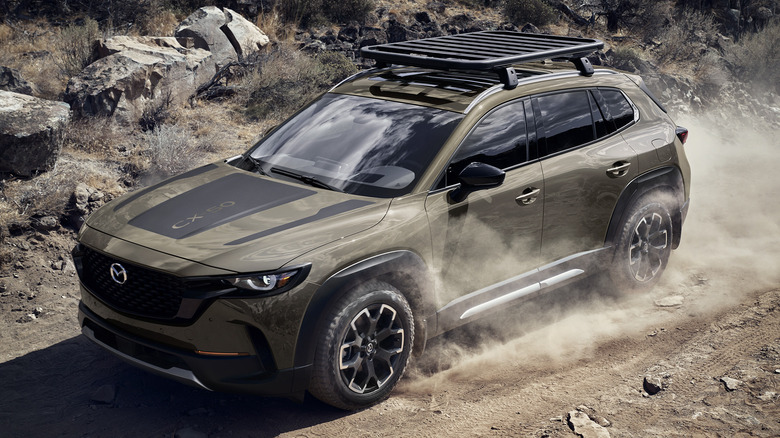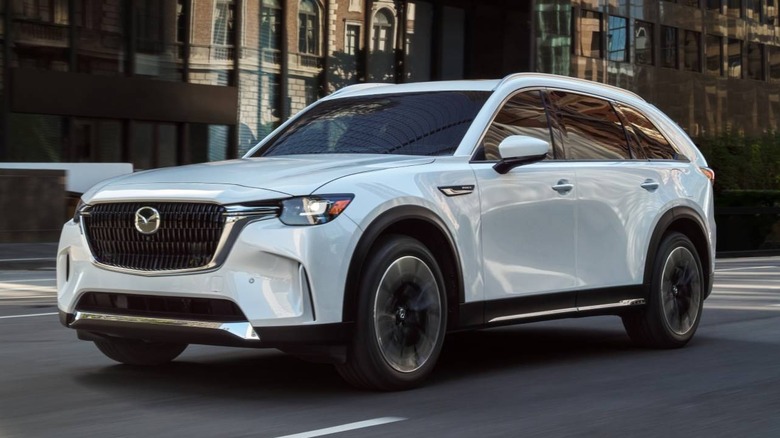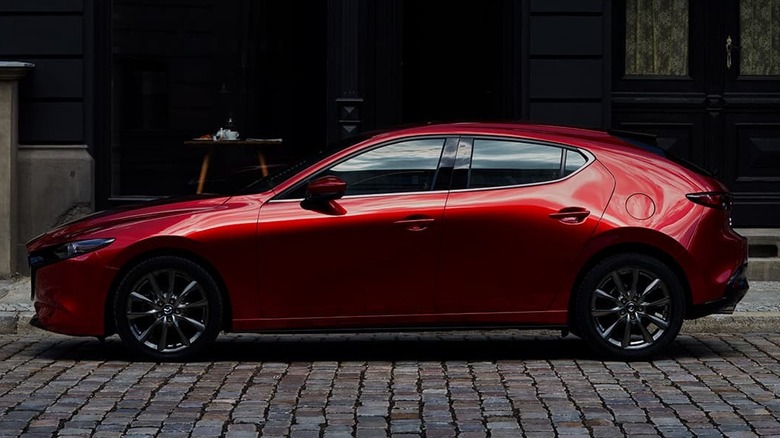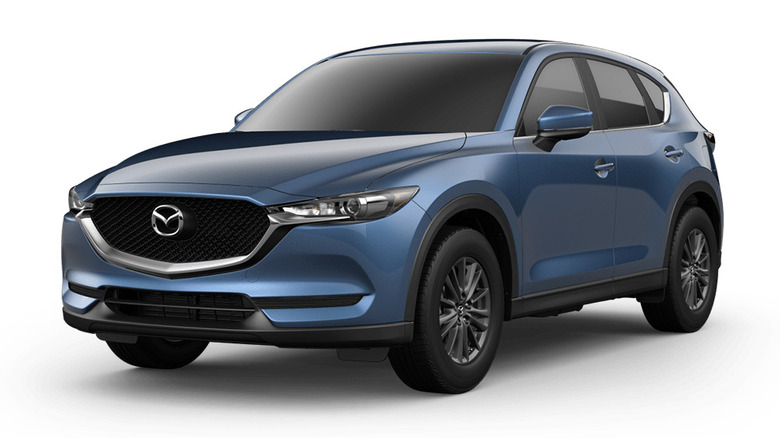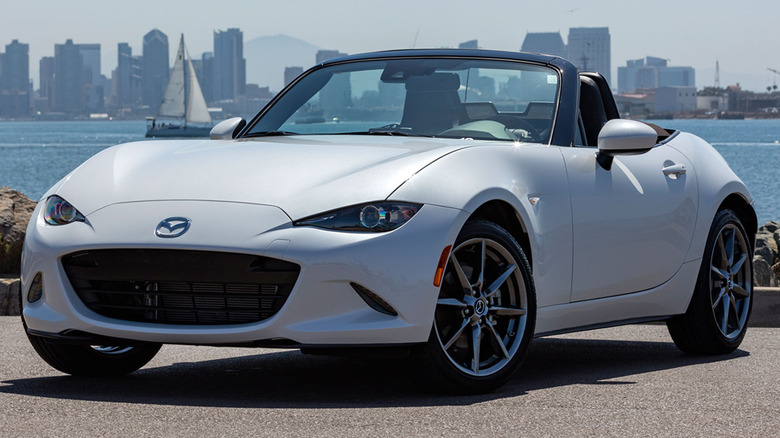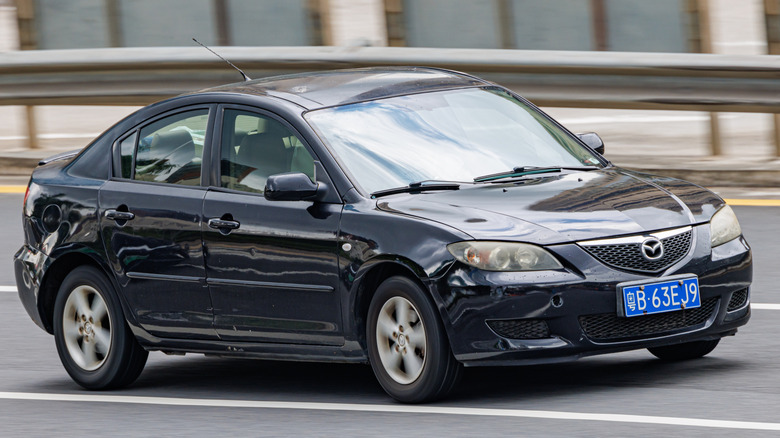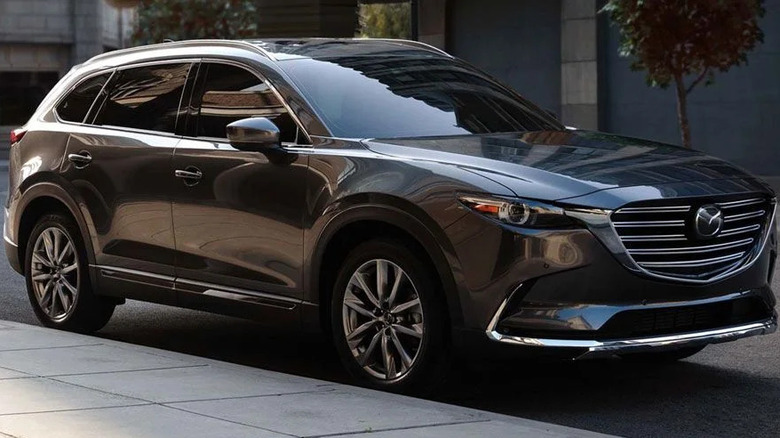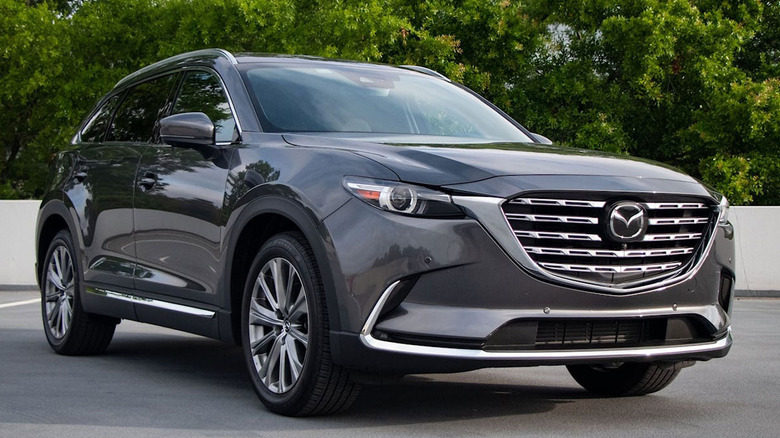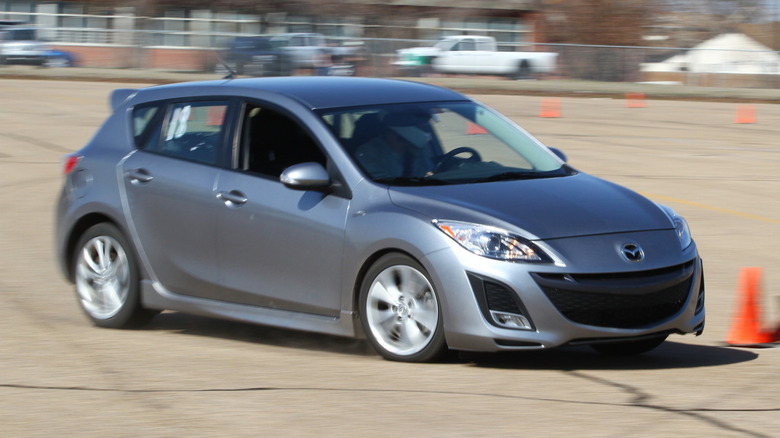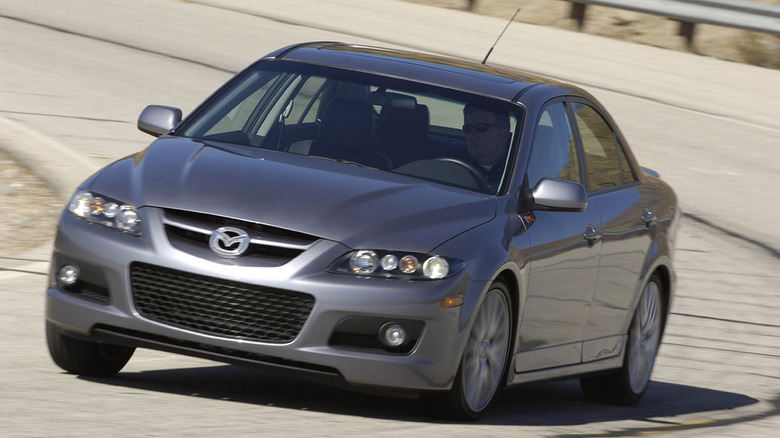10 Of The Biggest Mazda Recalls In Recent History
These days, cars weigh thousands of pounds and feature complex technology in their engines and onboard computer systems. It's only logical that unforeseen errors can present themselves after a new model has been released to the public. When one of these issues becomes known, the car manufacturer issues a recall in an effort to remove dangerous vehicles from the road, ensuring consumers are protected from harm, or perhaps to protect the car companies from litigious customers. Probably a little bit of both.
All major car manufacturers have recalled their vehicles at some point, and Mazda, the Japanese company founded in 1920, is no exception. From airbag troubles to faulty emergency brakes and busted computer software, Mazda has seen more than its fair share of product recalls. Although the company has existed for more than a century, we'll focus on its recent history for the sake of modern consumers.
2024 ESU recall
Back in the old days, cars had an engine, a seat, four wheels, and nothing in the way of frills or extra features. Heck, they didn't even have power windows. Now, cars have parking cameras, electric engines, and sophisticated computer systems. In 2024, Mazda issued a recall on over 80,000 vehicles due to problems with their Dash ESU, or Dash Electrical Supply Unit.
The impacted vehicles included 2024-2025 models of the CX-90 and 2025 models of the CX-70. When powered on, the Dash ESU caused features such as the defroster and battery cooling systems to malfunction. One can easily imagine how a faulty defroster or an overheated battery can spell trouble on the road. And with the issue tied to onboard computers, it wasn't something a customer could simply get fixed at their local mechanic's garage. Ultimately, Mazda updated the ESUs on the recalled vehicles, making them road-safe once again.
2019 emergency brakes recall
Generally, a vehicle owner wants their brakes to work. Nobody wants to roll towards a red light and hit the brakes, only for nothing to happen. However, the opposite can also be a problem. If you're driving and the brakes suddenly engage for no reason, that's a recipe for disaster. Unfortunately, 35,000 Mazda vehicles from model years 2019 and 2020 had this very issue, where the AEB (Automatic Emergency Braking) system would engage, forcing the car to stop even when there was no good reason to do so.
This issue came about as a result of the increased reliance on computer technology over a driver's own senses. In my cases, computers can be faster and more efficient at detecting and reacting to threats, but sometimes, computers make mistakes. It doesn't take a safety expert to figure out that, if a car stops suddenly in the middle of the road, it becomes susceptible to sudden rear-end collisions. The 2019 recall of Mazda sedans and hatchbacks showed that, while computers can be a useful tool behind the wheel, giving them too much control over the driving experience and taking that control away from the human driver can be a dangerous proposition.
2021 faulty fuel pumps recall
Again, it's rarely a good thing when a car suddenly stops, especially if it happens to be cruising down the highway at considerable speed. In 2021, Mazda issued a recall of 120,000 vehicles that could suddenly stall out while driving. However, unlike the previous entry, which dealt with computer issues, this recall was due to a defective fuel pump. Affected models included Mazda3 sedans and hatchbacks, Mazda6 sedans, the CX-3, CX-5, and CX-9 SUVs, MX-5 Miata coupes and convertibles, and Mazda2 hatchbacks, with model years from 2018 through 2020.
Fuel pumps bring gasoline from the gas tank to the engine, where it is combusted to power the car. The faulty fuel pumps involved in the recall didn't provide enough pressure to get the gas from the fuel tank to the engine, causing the car to stall. This issue wasn't directly Mazda's fault, but the fault of Denso, the company that sold the pumps to Mazda and other automobile houses, including Ford, Toyota, and Subaru, among others.
2024 recall regarding overzealous airbags
It's important for an airbag to deploy when a car is in an accident. Airbags save lives. Their sudden deployment may cause minor injuries, but some bruises are nothing compared to the full force of a high-speed collision. However, problems can arise if an airbag deploys at the slightest provocation. No one wants their airbag going off during a minor fender bender, but that possibility is exactly what led to this particular product recall.
In 2024, Mazda recalled 93,000 cars for having overzealous airbags. The affected vehicles were the MX-5 Miata from 2016 to 2023 and the Fiat 124 Spider from 2017 to 2020. The airbags were calibrated to deploy with near-explosive force even in minor collisions. In these cases, the airbags were more dangerous than the potential accidents that could trigger them. The airbags themselves were not defective, so recalled vehicles only had to receive a free software update to resolve the issue and restore the overly excitable airbags to their normal state.
Different 2024 recall over... explosive airbags?
Once again, we feel the need to remind our readers that airbags are vital, life-saving tools that are integral to driver safety. That being said, sometimes they can explode. We don't mean they can deploy with a force that can be interpreted as explosive. We mean they can literally explode upon deployment. Such was the case that led to the 2024 recall of over 82,000 Mazda vehicles, going all the way back to the 2003–2008 Mazda6. Other impacted cars included the B-Series from 2007-2009, the MazdaSpeed6 from 2006-2007, the RX-8 from 2004–2011, the CX-7 from 2007-2012, and the CX-9 from 2007-2015. If you think that's a lot, think again: Ford also used Takata airbags and had to recall over 374,290 of its vehicles.
The issue was that these airbags could explode upon deployment, causing potentially fatal injuries. The fault was with Takata, the company that produced the airbags. According to NHTSA, 27 people in the United States were killed by the exploding Takata airbags, and hundreds more were injured. The airbags would become defective after prolonged exposure to heat and humidity, which meant that drivers in warm, swampy states like Florida and Louisiana were at higher risk of exploding Takata airbags.
2021 recall over airbag shrapnel problem
Rounding out the "airbag trilogy" section of this story, we have the 2021 recall over airbag shrapnel. To be fair to the airbags, this one isn't the fault of the airbags themselves, but rather the fault of the manufacturer's vanity. The airbag covers contained a plastic emblem featuring the product logo. This emblem was made with polyurethane, which would weaken and corrode following prolonged exposure to sunlight. Then, when involved in a traffic accident, the airbag would smash the emblem into tiny pieces of dangerous shrapnel that could cause severe injury to the driver and passengers. Nobody wants to be pelted with shards of sharp plastic. It's inconvenient.
As a result of this design flaw, Mazda issued a recall of over 260,000 cars. The fix was simple, with Mazda replacing the airbag cover with a new version featuring a different emblem containing no polyurethane, meaning it won't become an impromptu shrapnel grenade upon airbag deployment.
2021 recall over dangerous sliding seats
One of the best things about an SUV is the amount of space at your disposal. With three rows of seats, plus ample room for junk in the trunk, there's plenty of space for extra passengers, luggage, moving boxes, or whatever else you want to transport from one location to another. And if there's still not enough space, the seats can slide forward or backward. Of course, after sliding back and forth, they're supposed to lock into place so passengers don't jostle around. Unfortunately, that wasn't the case with all of the 2020 and 2021 CX-9 SUVs, which, in 2021, led to Mazda issuing a recall of over 8,600 of the bulky cars.
In the affected vehicles, the middle row of seats had trouble locking into position, and in the event of a car crash, would slide forward, pressing the seatbelt hard against the passenger's chest. Being accidentally strangled by a seat belt is not ideal, nor is the physical trauma that comes from being launched forward by a sliding seat; both situations can cause injury and exacerbate the impact of a collision to even more dangerous levels. Mazda replaced the faulty components, thereby fixing the issue.
2023 reversing audio recall
The 2024 Mazda CX-90 had a problem with its audio system that was more annoying than anything, but still presented a risk of causing an accident. The car featured an external audio system called the "Approaching Vehicle Audible System Information Sound Box" (or AVAS ISB for short), which would play a sound while the vehicle was moving in reverse, warning pedestrians of the hybrid SUV's presence.
Unfortunately, the CX-90's AVAS ISB would play the 'reverse sound' whenever it felt like it, even when the car was moving forward. This could cause serious confusion for bystanders and nearby drivers, who might instinctively look for a reversing car that wasn't there. Plus, it was just awkward to drive around with external speakers blaring for no good reason. In 2023, 17,600 affected CX-90s were recalled, with Mazda reprogramming the AVAS ISB to ensure it worked as intended.
2023 rearview camera recall
Many modern vehicles feature rearview cameras to assist drivers with parking and backing up. Experienced, old-school drivers know how to use their mirrors to accomplish this task, but not everyone has the skills of an MTA bus driver or other professional drivers. In any case, for drivers who rely on these cameras, the last thing they want is for the cameras to fail, but that's exactly what happened with CX-3 SUVs from 2016 to 2021 and Mazda3 hatchbacks from 2014 to 2018.
In total, over 227,000 vehicles were impacted by the 2023 recall. Due to wear and tear from vibrations, the wiring on the rearview camera could come loose, leading to a faulty, distorted, and otherwise unclear image displayed on the camera screen. Thankfully, the recall fixed the issue by either installing a fastening seal to prevent further degradation or replacing the camera entirely on units that were already compromised.
2021 fuel leak recall
In 2021, Mazda issued a recall on 13,891 cars regarding fuel leaks. The impacted vehicles were the RX-8 from 2009 to 2011 and the MazdaSpeed6 from 2006 to 2007. The fuel pump mounting ring, the component that connects the pump to the fuel tank, could crack due to heat erosion, causing a leak.
The recall fixed the issue by replacing the ring and adding thermal insulation to the fuel tank, thereby preventing the problem from recurring. That's handy, since fuel leaks are terribly inconvenient. Gasoline is expensive, and nobody wants to see it leak out onto the asphalt. Even worse, if the leak is internal, it could cause an engine fire that could ultimately engulf the whole car in flames.
